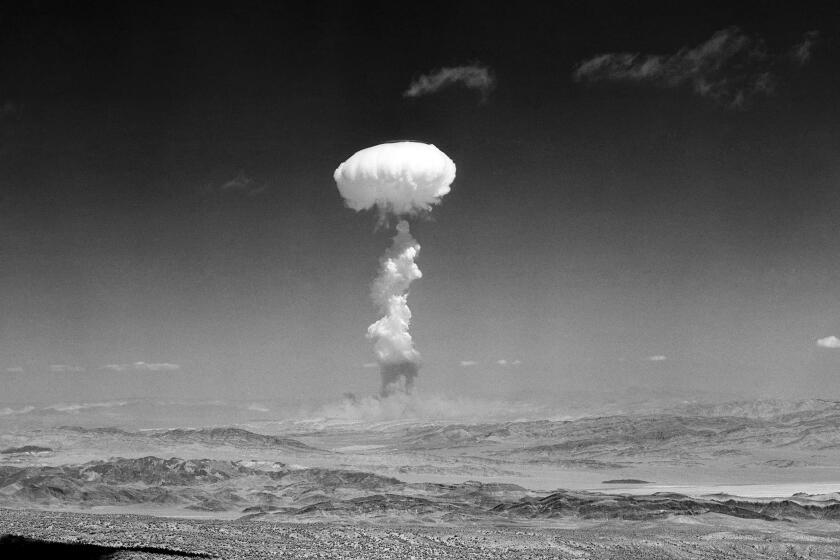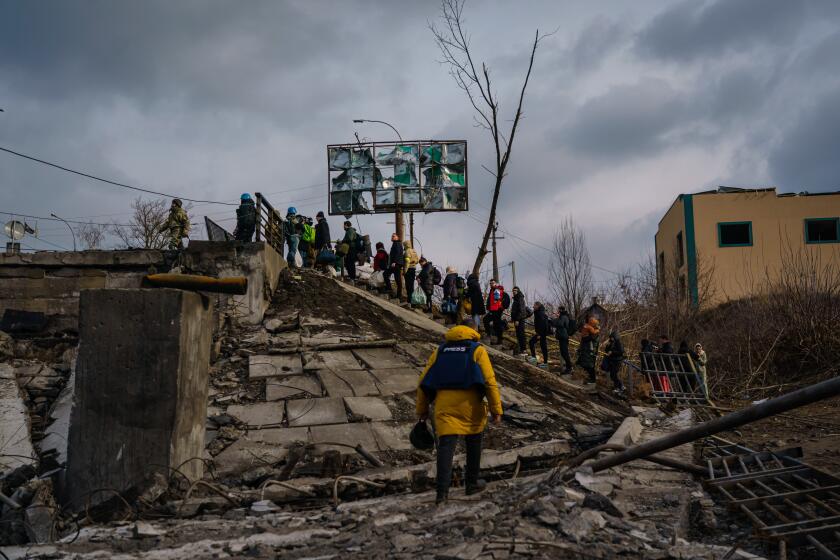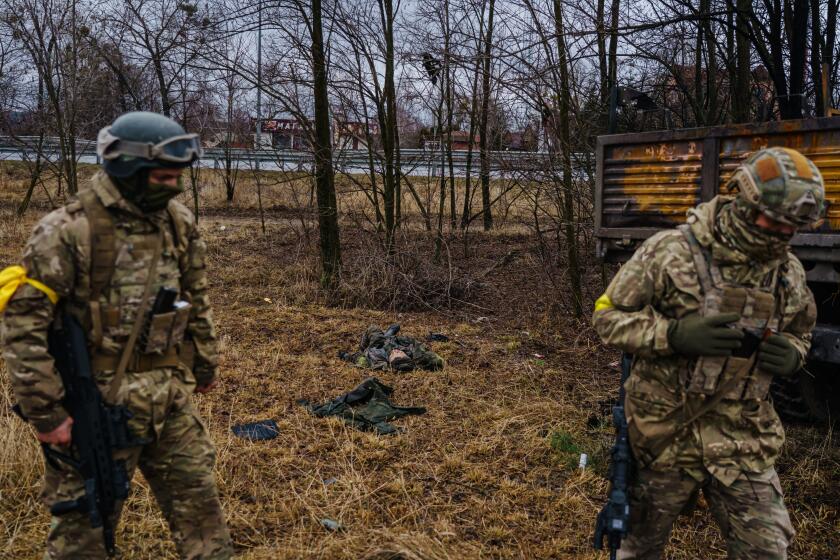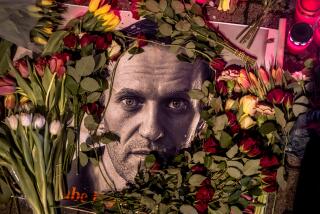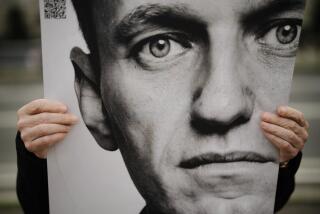In Germany, ex-Chancellor Schroeder and others cozy with Putin are ostracized
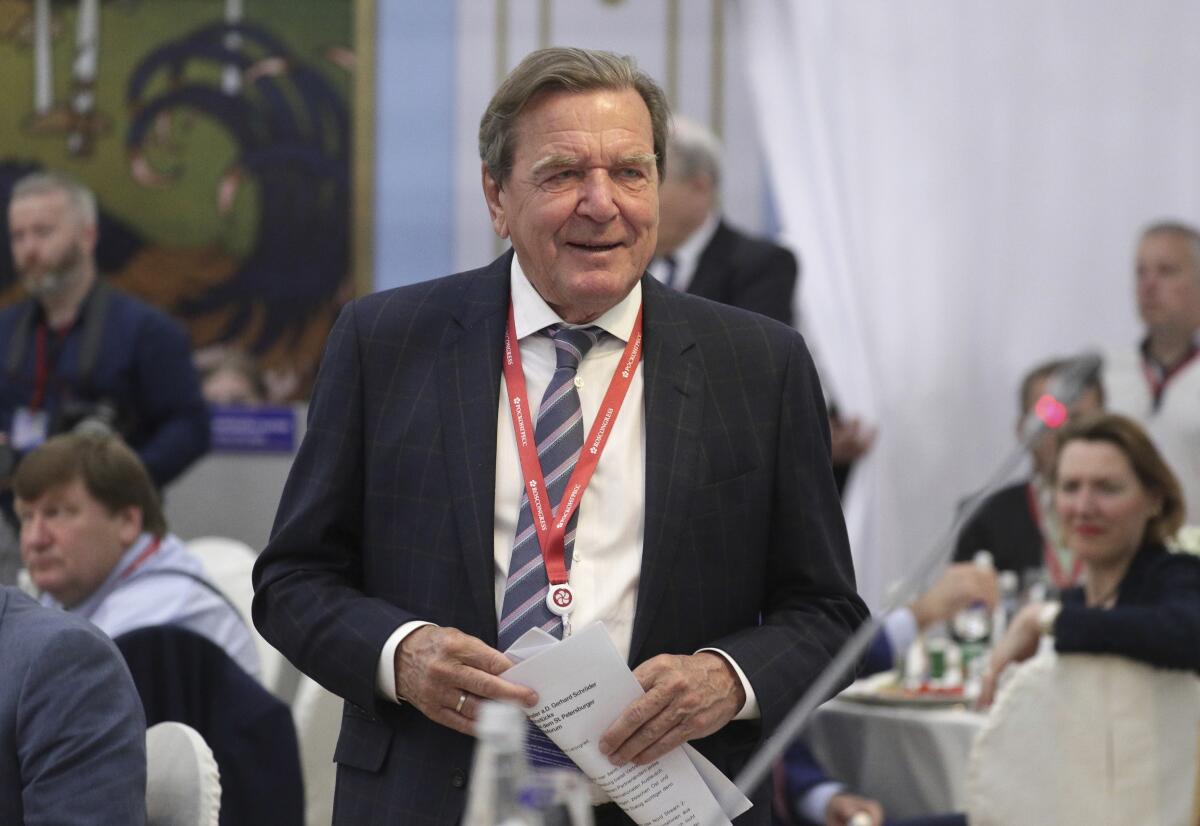
BERLIN — A former German chancellor who was cheered for his refusal to take part in the U.S.-led invasion of Iraq and admired for his sweeping reforms of the country’s ailing economy has become persona non grata at home because of his unflagging loyalty to Russian President Vladimir Putin.
Gerhard Schroeder, who served from 1998 until 2005, when he lost power to Angela Merkel in a close election, quickly pivoted to a post as a well-paid lobbyist for the Russian energy empire tied to his friend Putin.
The arrangement raised eyebrows. But it wasn’t until Schroeder, 77, raised criticism of Ukraine’s “saber-rattling” last month, just before Russia’s invasion — coupled with his subsequent refusal to distance himself from Putin — that his ties have become a source of national embarrassment. Many who view Schroeder as a Putin apologist are calling for him to step down from his executive positions with Russian energy companies Gazprom and Rosneft and the Nord Stream gas pipeline projects.
“It’s not all right for Gerhard Schroeder to hold these positions, and I think he should give them up,” Chancellor Olaf Scholz said in a TV interview Thursday, shortly after Schroeder’s staff resigned en masse and he was unceremoniously removed from an honorary leadership position with his favorite soccer club, Borussia Dortmund. Schroeder has also been fired from several corporate oversight posts.
The fall from grace illustrates the sea change in German attitudes toward Russia since its invasion of Ukraine.
With a deep sense of guilt over their own country’s destructive and violent conduct in World War II — including its invasion of Russia — and the pacifist streak that ensued, many Germans had long argued that lasting peace and security in Europe were possible only by maintaining close ties to Russia. For some, that meant backing Moscow’s contention that NATO was pressing Russia with its agreements to grant membership to nations once within the Kremlin’s sphere of Eastern European influence.
Old anxieties returned last week as Putin’s forces invaded Ukraine and he warned foes who interfered of ‘consequences greater than any you have ever faced in history.’
Many Germans were thus willing to look away from Russia’s 2014 invasion of Crimea and ignore Ukrainian objections over the Nord Stream 2 project connecting Russia to Germany beneath the Baltic Sea — pipelines that robbed Ukraine of badly needed gas transit fees.
Leading up to Russia’s invasion of Ukraine, Scholz announced it would suspend the certification process for the Nord Stream 2 project. And in the days since the Feb. 24 invasion, Berlin has in effect tripled its defense spending and dropped its self-imposed ban on sending defensive weapons to Ukraine.
Several celebrities in Germany have been ostracized or publicly dismissed in the last week because they have declined to condemn Putin, who speaks fluent German, which he learned as a young intelligence agent stationed in the Communist East German city of Dresden during the Cold War.
The city of Munich removed Russia’s Valery Gergiev from his position as chief conductor of the Munich Philharmonic for declining to distance himself from Putin, a longtime friend. Anna Netrebko, a Russian opera star with close ties to Putin, has had her concerts at the Bavarian State Opera canceled.
There are an estimated 3.5 million Russian speakers in Germany, after about 2 million Russians immigrated to the country in the 1990s. Until now, they were often seen as welcome guests.
In Berlin and elsewhere, some Russian speakers have claimed in local media reports that they have been threatened. The window of a Russian food shop in Oberhausen was smashed and covered with anti-Russian graffiti; police said they believed a pro-Putin comment by a customer led to the attack.
A cease-fire in two southern Ukrainian cities meant to allow civilians to evacuate fell apart amid new Russian shelling, officials say.
At a Munich hospital, a doctor refused to treat a Russian patient, according to the Tageszeitung newspaper. The hospital later issued a statement critical of the action, saying it was a “personal act” by the doctor. The newspaper also said there were police reports around Germany of Russian speakers facing abuse on the streets, on social media and in schools.
“Unfortunately, there are outbursts of anger, hatred and despair that [are] unfair and leading to discrimination of innocent people,” said Bernd Fabritius, who heads the government office for minorities and ethnic Germans.
Some say they are afraid to speak Russian in public for fear of being ostracized, he said.
Berlin TV station RBB reported that students at the Russian-German school Lomonosov said they had faced abuse from German students. Anti-Russian graffiti was spray-painted on the school, the station said.
But the most attention has fallen on Schroeder, who has remained largely silent since the invasion began, except to post a comment on his LinkedIn account: “The war and the accompanying suffering for the people in Ukraine has to be ended as soon as possible. That’s the responsibility of the Russian government. There has been a lot of talk about mistakes and missed opportunities in the relationship between the West and Russia — on both sides.”
Juergen Hogrefe, who wrote a bestselling 2002 biography of Schroeder, said the ex-chancellor has tarnished his legacy by failing to distance himself from Putin after the war started — unfathomable behavior to the millions of Germans who thought wars in Europe would never happen again and who are now widely backing their government’s rush to reequip its armed forces, polls show.
“At the very [least], he should have distanced himself from Putin and given up his executive positions once the fighting began,” said Hogrefe. “The terrific political instincts he once had seem to have abandoned him this time around, and he has indeed become a figure of derision.
Russia’s war losses in Ukraine are far higher than Moscow admits, analysts believe. But will that spark anti-Putin sentiment?
“Schroeder won two German federal elections, and not without reason — he was charismatic and had a lot to offer for voters,” Hogrefe reflected. “He did a lot of important things for Germany, including modernizing the country and helping it break out of the conservative slumber era.”
Schroeder won reelection in 2002 against long odds — in part by standing up against President George W. Bush and refusing to join the “coalition of the willing” that invaded Iraq in 2003. Schroeder was part of a coalition, along with Putin and France’s Jacques Chirac, that rejected the war against Iraq and was dismissively labeled “old Europe” by then-Defense Secretary Donald H. Rumsfeld. The friendship between Schroeder and Putin grew deeper during that period.
With assistance from Putin and his wife, Schroeder and his wife adopted two children in 2004 and 2006 from Putin’s hometown of St. Petersburg. The adoptions were shrouded in secrecy and raised questions in part because Schroeder was older than 60 at the time. Media reports in Germany discussed whether the Schroeders had received preferential treatment.
Despite the worsening ostracism, there are some in Germany, especially in Schroeder’s center-left Social Democratic Party, who harbor hopes that he might be able to use his influence with Putin to help establish a cease-fire or even peace.
But others are doubtful that Schroeder has sway.
“I think it’s an illusion to think that Schroeder has any influence at all over Putin now,” said Gero Neugebauer, a political scientist at Berlin’s Free University. “He might have been a good chancellor at the time by modernizing Germany, putting the economy on a path for growth and keeping the country out of Bush’s Gulf War. But he turned himself into a ‘useful idiot’ for Putin and ruined his own reputation. It’s doubtful that there’s any role for Schroeder. He’s yesterday’s man.”
More to Read
Sign up for Essential California
The most important California stories and recommendations in your inbox every morning.
You may occasionally receive promotional content from the Los Angeles Times.
